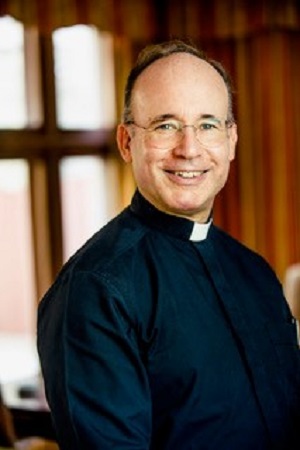Msgr. Martin Schlag, a professor at the University of St. Thomas in St. Paul, explained that Catholic social thought is the systematic reflection on how best to order society toward the common good in light of revelation. This is Msgr. Schlag’s topic for the Archbishop John Ireland Lecture, a speaking event at the University of St. Thomas.
For an episode of “Practicing Catholic” set to air at 9 p.m. Sept. 12 on Relevant Radio 1330 AM, Msgr. Schlag told co-hosts Leah Heselton and Father Tom Margevicius that his lecture on Catholic social teaching was inspired by a sentence in the book “The Drama of Atheist Humanism” by Henri de Lubac.

“(It was) written in 1941,” Msgr. Schlag said. He explained this was a time when the threat of totalitarianism came from both left and right ideologies.
“(Lubac) was confronted with this atheist intent to build a society without God,” Msgr. Schlag said. “And he said, it is not true, as is sometimes said, that man cannot build society without God. (Man) can, but in the end, it will be a society that turns against man, against the human person. So, atheist humanism is anti-humanist humanism.”
Msgr. Schlag said what he witnesses in current events are anti-humanist currents.
“It is anti-humanism in the sense that there are currents, anti-natalist movements, deep ecology, that would want a planet without human beings,” Msgr. Schlag said. “They actually promote the extinction of the human race in order to allow the planet to develop. … It sounds unbelievable but just go and Google it and you’ll come across these, as though humans were not part of nature and not the crown of creation and the purpose for which God created everything else.”
Anti-humanism, Msgr. Schlag said, can lead to political programs. The Catholic Church offers not a political program, but a wisdom based on the revelation of Jesus Christ and the dignity of the human person, he said.
“Or as John Paul II, St. John Paul II, used to say, ‘The answer to all atheist materialisms is the Holy Spirit, who brings the true spiritualism and the true vision of the human person,’” Msgr. Schlag said. “There are parts of Catholic social teaching that are something that has to do with the faith, but at the same time, that shouldn’t hinder us (from) speaking with confidence, because faith is more reasonable than pure reason. There’s an echo in the human person to the truths of faith that is stronger and frustrating for people who don’t believe and who want to exclude the Church from the public square. But again and again, faith proves to be more appealing to the human heart than just cold, pure calculus or scientific reason.”
Msgr. Schlag said that there is nothing as universal as human love.
“That is basically what Christianity spreads, especially to those who have nothing attractive about them in the mere human sense of the word,” Msgr. Schlag said. “Natural law, and Pope Leo XIV has repeated this, and Leo XIII was very strong in it, is a normative system based on human nature, and it is a language that is universally comprehensible across cultures, across times.”
To hear more from Msgr. Schlag about his lecture on Catholic social teaching, tune into “Practicing Catholic,” which repeats at 1 p.m. Sept. 13 and 2 p.m. Sept. 14.
Also on the show, Paul Iovino, director of the Office of Ministerial Standards and Safe Environment within the Archdiocese of St. Paul and Minneapolis, talks about school and parish security.
Produced by Relevant Radio and the Archdiocese of St. Paul and Minneapolis, “Practicing Catholic” can be heard after it has aired at archspm.org/faith-and-discipleship/practicing-catholic or choose a streaming platform at Spotify for Podcasters.




Rebuilding the domestic church: Why housing affordability is a pro-family cause